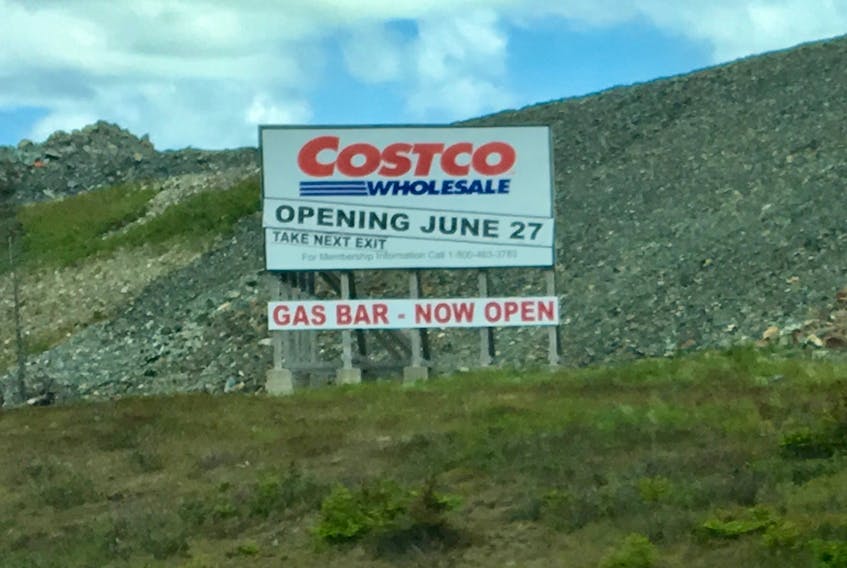It’s an interesting study of the news business as a whole — and in some ways, an interesting study of where we are in the democratic cycle.
That’s a strange way to talk about the opening of a single store, but there it is.

Thursday, Costco finally opened its new store in the Galway development in St. John’s. It’s been a carpet-bombing of media coverage for months now: that the store was moving, when it was moving, that there were delays in its move, the inevitable lineups when it did open, the presence of the Royal Newfoundland Constabulary to handle traffic. The huge barrels of olive oil that, if you were so inclined, you could roll out to your truck and haul away, safely lubricated for the next 10 years.
And, in the process, there was plenty of muttering that the coverage was too much, ranging all the way to saying that a store opening isn’t news to the fact that news organizations shouldn’t be essentially handing a corporation — and, for that matter, the Galway development — a windfall of free publicity.
Well, yes and no. News organizations have to select what they cover, because there are simply too many things happening. And in the process, you have to consider not only what people need to know, but what they want to know as well. It reminds me of an aged commercial for canned tuna fish, starring Charlie the Tuna, where the announcer’s voice over pointed out that people don’t want tuna with good taste, they want tuna that “tastes good.”
And that’s part of the news conundrum: often, people don’t want news that’s good for them, they want news that, well, tastes good.
In other words, they want to hear about things that directly improve or affect their lives. As a population, we tend to care less about major issues that affect the province overall, and even less again about very serious issues that are affecting a small portion of the population that doesn’t happen to be, well, us.
For example, opioid drug overdose deaths are a passing issue in the news if, sadly, it affects a measure of the population we don’t identify with. It suddenly becomes a huge issue when it starts reaching into our own homes and neighbourhoods. It may be harsh to say that stories about drug overdose deaths when it’s affecting drug abusers who live on the street in downtown neighbourhoods you would never visit have little traction, but when a couple of teenagers die of fentanyl overdoses at a suburban party, people suddenly sit up and take notice.
There is empirical evidence to show just that.
It’s now absolutely all right — in fact it’s expected and even congratulated — that people will put the interests of their paycheques and their creature comforts ahead of the needs someone who could die from government disinterest.
If you don’t believe it, you need only look at the huge web traffic numbers that appear when we post an article about a new major store opening, compared to the traffic numbers on important gaps in the health-care system. Until people can see how an issue comes directly home to their own neighbourhood or family, there are many issues in this province that it seems almost impossible to garner any interest in.
To me, and I might well be wrong, that’s also a sign of where we are as a country. We’ve been a stable democracy for so long, teetering back and forth between moderately conservative and moderately liberal governance, that the big issues barely seem to register.
Trying to make a mark and win over voters in a relatively tame battle of the similars, political parties have focused more and more on issues that directly affect individual voters. “We will lower your taxes.” “They will increase your taxes.” “They will take your money.” “We will give you money.”
It’s not about overall governance, deficits, the problem of paying massive amounts of interest on money we can’t afford to borrow. It’s not about who is better equipped to deal with monumental coming changes in climate. Bor-ing.
It’s now absolutely all right — in fact it’s expected and even congratulated — that people will put the interests of their paycheques and their creature comforts ahead of the needs someone who could die from government disinterest.
It is, of course, the antithesis of the whole concept of society, but who cares, as long as the bales of toilet paper and the bulk boxes of chicken nuggets are five dollars cheaper?
Is it bread and circuses? Absolutely it is — and that was a clear sign of the decay of democracy as well.
Is the news media to blame? No, though we might be complicit.
We’re still a mirror.
If we’re not showing people things that are in the wheelhouse they care about, we can’t get their eyes on our websites and our papers in their hands.
News organizations absolutely could focus solely on what was good for the population as a whole. And, very quickly, we’d be yodelling in the dark.
If it doesn’t also taste good, no one’s going to buy it.
To quote Pogo, a cartoon from just as long ago as Charlie the Tuna, “We have met the enemy and he is us.”
Russell Wangersky’s column appears in 36 SaltWire newspapers and websites in Atlantic Canada. He can be reached at [email protected] — Twitter: @wangersky.
MORE FROM RUSSELL WANGERSKY
• Hang onto those jerseys for now
• Federal scientists muzzled no more









